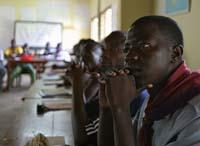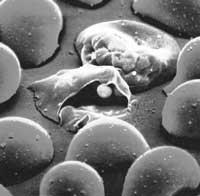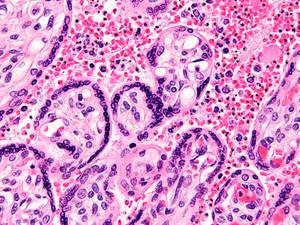Mutation: beneficial to some, harmful to others
2008/09/01 Elhuyar Zientzia Iturria: Elhuyar aldizkaria

According to a paper published in the scientific journal Cell Host and Microbe, a mutation that protects against malaria facilitates access to AIDS. On the other hand, paradoxically, AIDS patients suffering from this mutation live an average of two years longer than those without mutations.
The study was conducted by an international team of researchers, studying the genes of 3,400 Americans of African origin. Specifically, they have analyzed the DARC protein gene. This protein is found in red blood cells, which are associated with two malaria-causing parasites to infect blood cells. Therefore, by not producing proteins by mutation of this gene, they have the advantage that parasites cannot access the blood cells, so they are protected from malaria.
However, the mutation does not give total protection, since in addition to these parasites, others also produce malaria, which otherwise enter red blood cells. In any case, most sub-Saharan people have this mutation.
Previous studies have shown that DARC protein also helps the AIDS virus enter red blood cells. In order to confirm this, this team of researchers has shown that the AIDS virus is associated with the DARC protein, at least in the laboratory. Then 3,400 African Americans have been analyzed (in Africa almost all have a mutation difficult to compare with those who do not have a mutation). In this way, these people have investigated the relationship between having a mutation and the risk of AIDS infection.
The result of the research has been surprising, since people with mutations, i.e. without DARC proteins, have a 40% higher risk of AIDS infection. In addition, they have seen that the mean life of those affected is two years more than that of those who do not have AIDS with mutation.
They still don't know why mutators are more easily infected, or why they survive when they get sick. In addition, they have performed a single test and have to do more to confirm that the results are correct. But if confirmed, Cheryl Winkler, a researcher at the U.S. Cancer Institute, has stated in Nature that "research can have a big impact."

Gai honi buruzko eduki gehiago
Elhuyarrek garatutako teknologia





